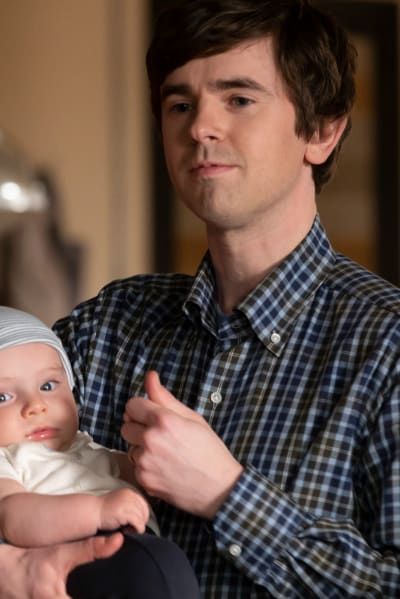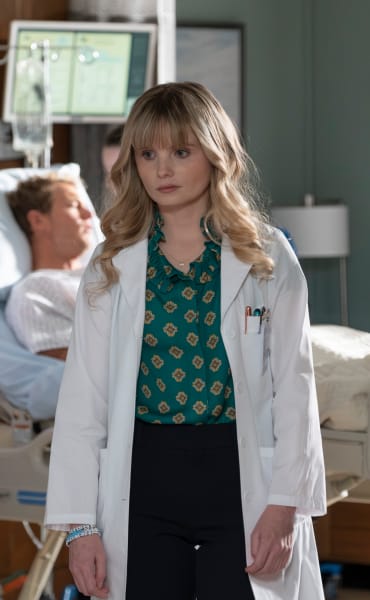The Good Doctor centered around autism in a way no other series had.
Love it or hate it, there’s no denying it made a strong impact. For the past seven years, viewers have gotten to know Shaun as he struggled professionally and personally, which changed how autistic characters are portrayed.
As The Good Doctor Season 7 heads toward its conclusion, let’s look at the influence this series has had on autistic representation.
There have been other shows that featured autistic characters, but they often focused on the effect a family member’s autism had on the rest of the family, especially the adults.
Parenthood was especially guilty of this, making Max’s autism all about how difficult it was for the Bravermans to have an autistic child.
Netflix‘s Atypical did a slightly better job, making Sam a full-fledged, three-dimensional character. Still, a lot of airtime was given to his sister’s resentment over having to take care of him and his mother’s mid-life crisis when s he realized he was more independent than she thought.
This doesn’t begin to compare with the way The Good Doctor handled Shaun’s autism.
When The Good Doctor first began, Shaun was a young man with dreams of becoming a doctor who had to prove himself because too many doctors thought his autism made him a liability to the hospital.
The series was an ensemble drama from the beginning, but the focus was on Shaun’s journey, not on how much easier everyone else’s life would be if Shuan were neurotypical.
Over the next six years, Shaun grew into a capable doctor, yet struggled with relationships because of his autism. Much airtime was devoted to his relationship with Lea, but they eventually married and had their own baby, demonstrating that autistic people can do that, too.
The Good Doctor Ended Some Negative Stereotypes But Inadvertently Reinforced Another
From The Good Doctor Season 1 Episode 1, the series sought to show Shaun as more capable than people believed. The idea that autism was a tragedy or that autistic people can’t function well enough to work at a professional-level job was gone, smashed from the first minute of the first hour.
This is a good thing and a trend I want television to continue.
However, The Good Doctor fell into the trap of casting Shaun as a savant — someone who was impaired in many ways but had an exceptional talent that made him brilliant in one area.
This idea is controversial because not all autistic people are savants.
Many have average or above-average intelligence, work at various jobs, and live lives similar to their neurotypical peers without being geniuses in any area of their lives.
Some autistic people hate the savant trope because they feel it suggests that autism is only acceptable if it gives the person a superpower.
Shaun Is More Three-Dimensional Than Many Autistic Characters Despite His Savant Status
Although Shaun’s ability to visualize novel approaches to surgical problems was a superpower that most autistic people don’t possess, he also didn’t entirely fit the tired TV trope of the autistic savant because he was functional in many areas of his life.
He could live independently, though he took a bus instead of driving, worked at the hospital, and made friends despite his confusion about social skills. This was particularly true during the first few seasons when Claire worked with him.
Claire was patient with Shaun when he didn’t understand social cues, didn’t judge him, defended him against bigotry, and offered emotional support.
Shaun was also a good friend to her despite his social difficulties, which smashed the stereotype that autistic people cannot have two-sided relationships.
Unfortunately, Antonia Thomas left after The Good Doctor Season 4, and Shaun never found another friend as good as her. At this point, the series focused on his romantic relationships, and he and Lea soon became central to the show.
Shaun’s Empathy Busted Another Stereotype
One pernicious stereotype about autistic people is that they don’t possess empathy. This is entirely untrue, and studies have shown that autistic people tend to possess more empathy than the average person but sometimes shut down because they’re overwhelmed.
Although Shaun’s directness and logical approach to issues made it seem like he was unempathetic, the opposite was true.
He had empathy for patients who needed impractical surgeries, which was part of what drove him to find alternate solutions, and he had empathy for his friends, even if they didn’t always think so.
There is more to empathy than simply stating that you understand how someone feels or having an excellent bedside manner. Shaun struggled sometimes with communicating how he felt, but he didn’t lack empathy.
Shaun’s Meltdowns Toed The Line
One area where the writers sometimes used questionable judgment was Shaun’s meltdowns, especially during the early seasons.
Meltdowns are often a fact of life for autistic people, especially if they are overstimulated or overwhelmed. Still, some of Shaun’s behaviors were turned into ugly memes that people laughed at.
One famous example occurred during The Good Doctor Season 2 Episode 17. Dr. Han, who did not believe Shaun could be a surgeon, ordered Shaun to report to pathology again. Shaun melted down, saying over and over that he was a surgeon.
This clip was taken out of context, and memes made fun of Shaun’s intensity in this scene. This is the danger of showing this aspect of autism as taken out of context; it looks like someone is overdramatic and immature, which contributes to negative stereotypes.
For those of us who accompanied Shaun on his journey, though, meltdowns like these were understandable, and they helped some autistic people feel more visible, so the good likely outweighed the bad here.
Still, the series had to be careful not to reinforce ableist stereotypes when depicting these issues.
Not All Autistic People Are Alike
Although The Good Doctor did a lot of good for autistic people, during Season 7, it seems to be making the critical error of depicting all autistic people as being the same.
New character Charlie is the first autistic character played by an autistic actress, a significant achievement that should not be overlooked. However, the on-the-nose portrayal of Charlie as Shaun 2.0 reinforces the stereotype that all autistic people act a certain way.
Charlie has improved since her first episode, so there’s hope that the series will rectify this before it ends. Hopefully, that will be the case because it would be a shame to ruin its legacy of breaking stereotypes regarding autistic people with this serious misstep.
Over to you, The Good Doctor fanatics. How do you think the television landscape has changed for autistic characters after The Good Doctor?
Hit the big, blue SHOW COMMENTS button and let us know.
The Good Doctor airs on ABC on Tuesdays at 10/9c.
Jack Ori is a senior staff writer for TV Fanatic. His debut young adult novel, Reinventing Hannah, is available on Amazon. Follow him on X.













